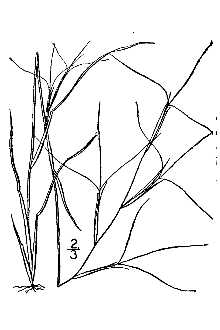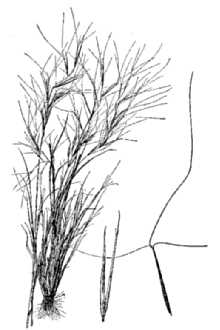Prairie Threeawn
Scientific Name: Aristida oligantha Michx.

| General Information | |
|---|---|
| Usda Symbol | AROL |
| Group | Monocot |
| Life Cycle | Annual |
| Growth Habits | Graminoid |
| Native Locations | AROL |
Plant Guide
Use soil moisture sensors to measure the soil moisture of Prairie Threeawn.
Fact Sheet
Alternate Names
oldfield three-awn, oldfield 3-awn
Uses
Prairie threeawn has little value as a forage grass. After maturity, seeds get in the wool of sheep and in the eyes of both cattle and sheep if they graze areas with a dense stand. This grass establishes easily under adverse conditions and protects soil against erosion until more desirable grasses take over. It is an indicator of deteriorated range condition.
Status
Please consult the PLANTS Web site and your State Department of Natural Resources for this plant’s current status, such as, state noxious status and wetland indicator values.
Description
Prairie threeawn is a native, cool-season, annual grass. The height is between 6 and 20 inches. The leaf blade is flat, about 1/4 inch wide, and rolls inward during hot, dry weather. The leaf sheath is mostly basal. The seedhead is a loose, open panicle; glumes have three awns about 1-1/2 to 3 inches long that curve at the base. © Larry Allain USGS National Wetlands Research Center @ plants.usda.gov Distribution: For current distribution, please consult the Plant Profile page for this species on the PLANTS Web site.
Management
Range reseeding with perennial grasses is the most practical and economical way to reduce this grass and improve ranges for livestock production, , Use soil moisture sensors to measure the soil moisture of Prairie Threeawn.
Establishment
Prairie threeawn growth starts in early spring from seed. The life cycle is one month to 6 weeks. Prairie threeawn is a good seed producer. The seedlings are vigorous. It grows readily on areas, such as old abandoned fields, oil-well locations, and cattle round-up grounds. Cultivars, Improved and Selected Materials (and area of origin) Please contact your local NRCS Field Office.

